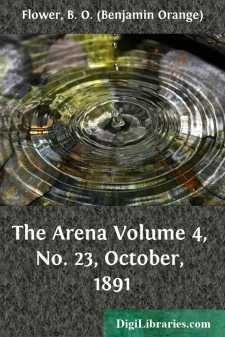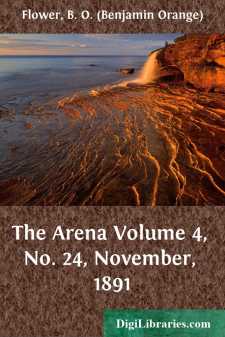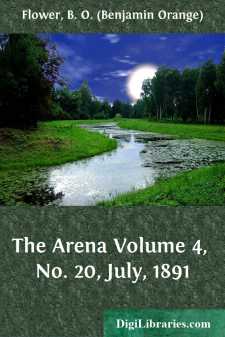Categories
- Antiques & Collectibles 13
- Architecture 36
- Art 48
- Bibles 22
- Biography & Autobiography 813
- Body, Mind & Spirit 142
- Business & Economics 28
- Children's Books 14
- Children's Fiction 11
- Computers 4
- Cooking 94
- Crafts & Hobbies 4
- Drama 346
- Education 46
- Family & Relationships 57
- Fiction 11829
- Games 19
- Gardening 17
- Health & Fitness 34
- History 1377
- House & Home 1
- Humor 147
- Juvenile Fiction 1873
- Juvenile Nonfiction 202
- Language Arts & Disciplines 88
- Law 16
- Literary Collections 686
- Literary Criticism 179
- Mathematics 13
- Medical 41
- Music 40
- Nature 179
- Non-Classifiable 1768
- Performing Arts 7
- Periodicals 1453
- Philosophy 64
- Photography 2
- Poetry 896
- Political Science 203
- Psychology 42
- Reference 154
- Religion 513
- Science 126
- Self-Help 84
- Social Science 81
- Sports & Recreation 34
- Study Aids 3
- Technology & Engineering 59
- Transportation 23
- Travel 463
- True Crime 29
The Arena Volume 4, No. 23, October, 1891
Categories:
Description:
Excerpt
With loving breath of all the winds, his name
Is blown about the world; but to his friends
A sweeter secret hides behind his fame,
And love steals shyly through the loud acclaim
To murmur a God bless you! and there ends.
When Longfellow had reached his sixtieth year, James Russell Lowell, then in his splendid prime, sent him those lines as a birthday greeting. Lowell, since then, received in his turn many similar tributes of affection, but none that seemed to speak so promptly from the heart as those touching words of love to an old friend. To himself they might well have been applied in all truthfulness and sincerity. Of the famous group of New England singers, that gave strength and reality to American letters, but three names survived until the other day, when, perhaps the greatest of them all passed away. Whittier and Holmes remain, but Lowell, the younger of the three, and from whom so much was still expected, is no more to gladden, to delight, to enrich, and to instruct the age in which he occupied so eminent a place. Bryant was the first to go, and then Longfellow was called. Emerson followed soon after, and now it is Lowell’s hand which has dropped forever the pen. At first his illness did not cause much uneasiness, but those near him soon began to observe indications of the great change that was going on. At the last, dissolution was not slow in coming, and death relieved the patient of his sufferings in the early hours of Wednesday, August 12th. Practically, however, it was conceded that his life-work had been completed a few months ago, when his publishers presented the reading world with his writings in ten sumptuous volumes, six containing the prose works, and the other four the poems and satires. He was, with the single exception of Matthew Arnold, the foremost critic of his time. Everything he said was well said. The jewels abounded on all sides. His adroitness, his fancy, his insight, his perfect good-humor, and his rare scholarship and delicate art, emphasize themselves on every page of his books. His political and literary addresses were models of what those things should be. They were often graceful and epigrammatic, but always sterling in their value and full of thought. Long ago he established his claim to the title of poet, and as the years went by, his muse grew stronger, richer, fresher, and more original. As an English critic, writing pleasantly of him and his work, in the London Spectator said lately: “His books are delightful reading, with no monotony except a monotony of brilliance which an occasional lapse into dulness would almost diversify.”
James Russell Lowell was descended from a notable ancestry. His father was a clergyman, the pastor of the West Church in Boston. His mother was a woman of fine mind, a great lover of poetry, and mistress of several languages. From her, undoubtedly, the gifted son inherited his taste for belles-lettres and foreign tongues. He was born at Cambridge, Mass., on the 22d of February, 1819, and named after his father’s maternal grandfather, Judge James Russell....






